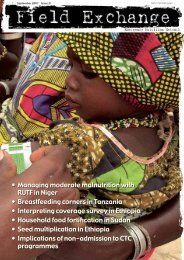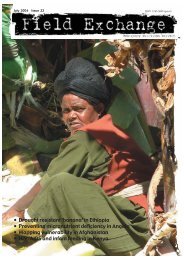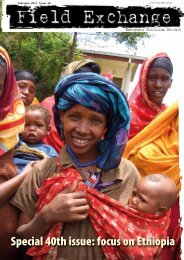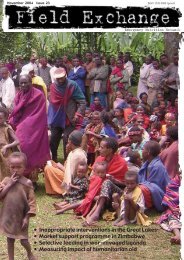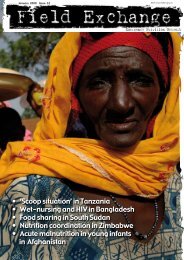Download a PDF of this issue - Field Exchange - Emergency ...
Download a PDF of this issue - Field Exchange - Emergency ...
Download a PDF of this issue - Field Exchange - Emergency ...
You also want an ePaper? Increase the reach of your titles
YUMPU automatically turns print PDFs into web optimized ePapers that Google loves.
Evaluation<br />
Management <strong>of</strong><br />
acute malnutrition<br />
programme review<br />
and evaluation<br />
Summary <strong>of</strong> evaluation 1<br />
Young girl recovering from severe malnutrition,<br />
OTP centre in Kaedi, Mauritania<br />
David Rizzi, Mauritania, 2010<br />
By Yvonne Grellety, Hélène Schwartz and David Rizzi<br />
Yvonne Grellety is an independent advisor on international<br />
health and nutrition to humanitarian agencies<br />
working in the developing world. She has extensive<br />
experience in the emergency nutrition sector over 30<br />
years and more, working with MSF and ICRC, ACF and<br />
UNICEF, particularly in challenging contexts.<br />
Helene Schwartz is currently working with UNICEF<br />
WCARO as the IMAM focal point. She has previously<br />
worked in nutrition programmes including CMAM<br />
with a number <strong>of</strong> agencies in many countries,<br />
including ACF in Sudan, Burundi and Nepal, UNHCR<br />
in Chad and UNICEF in West and Central Africa.<br />
David Rizzi is currently working for UNICEF North<br />
Korea on the CMAM programme and providing<br />
technical assistance to the Ministry <strong>of</strong> Public<br />
Health. He has worked and consulted for NGOs<br />
and UNICEF in many countries including Angola,<br />
Burundi, DRC, Mali, Mauritania and Chad.<br />
In 2009, twenty countries in West and<br />
Central Africa were implementing<br />
programmes to address acute malnutrition.<br />
These programmes include the protocol,<br />
training modules, monitoring and evaluation<br />
and support for implementation at in- and outpatient<br />
facilities and at community level. The<br />
aim in most <strong>of</strong> the countries was primarily to<br />
increase the coverage <strong>of</strong> the programme.<br />
UNICEF WCARO (West and Central Africa<br />
Regional Office) considered it important to<br />
have an independent evaluation <strong>of</strong> the progress<br />
and quality <strong>of</strong> implementation and coverage <strong>of</strong><br />
the programmes and to identify their strengths<br />
and weaknesses, in order to provide sound<br />
technical advice to country <strong>of</strong>fices. The planned<br />
evaluation comprised the review <strong>of</strong> the existing<br />
programmes, involving field visits <strong>of</strong> 10 to 15<br />
days each in nine countries that were willing to<br />
participate: Benin, Burkina Faso, Côte d’Ivoire,<br />
Democratic Republic <strong>of</strong> Congo (DRC), Liberia,<br />
Mali, Mauritania, Sierra Leone and Togo.<br />
The key tasks were:<br />
• to analyse the national programme’s documents<br />
(protocols, training modules and<br />
monitoring evaluation tools) and provide<br />
recommendations to ensure that they were inline<br />
with the international standards, current<br />
best practice and any new scientific evidence<br />
• to assess the implementation at field level<br />
and provide feedback on front-line activity<br />
and problems<br />
• to review critically the effects <strong>of</strong>, and<br />
problems with, scaling up the programme<br />
and identify the main bottlenecks, and<br />
• to make recommendations at national and<br />
regional level in order to ensure the quality<br />
control <strong>of</strong> the programme within the region.<br />
After a ten days preparation mission in Dakar,<br />
a first evaluation was made in Mauritania and<br />
Benin, in order to test and standardise the<br />
methods. The personnel then divided into two<br />
teams. A total <strong>of</strong> 35 interviews and/or observations<br />
were conducted with programme<br />
managers <strong>of</strong> the Ministries <strong>of</strong> Health and international/<br />
national non-governmental organisations<br />
(NGOs), 34 evaluations <strong>of</strong> in-patient facilities<br />
(IPF), 50 <strong>of</strong> outpatient therapeutic<br />
programmes centres (OTP) and 10 <strong>of</strong> supplementary<br />
feeding centres (SFC).<br />
For each country, the team provided a<br />
detailed report describing the protocols, tools<br />
and the strategy used, with recommendations.<br />
Available individual data and monthly reports<br />
<strong>of</strong> databases were collected, analysed and their<br />
results integrated in the annexes <strong>of</strong> the final<br />
country report.<br />
Main results<br />
The national protocols were updated between<br />
2005 and 2009. All included outpatient care, but<br />
still very few countries had adopted the 2006<br />
WHO Growth Standards. Two countries used<br />
the opportunity <strong>of</strong> the evaluation visit to<br />
update their protocol (Benin and Côte d’Ivoire).<br />
However, the protocols <strong>of</strong> Burkina Faso, Mali,<br />
Sierra Leone, Mauritania and DRC required<br />
revision. The protocol <strong>of</strong> Togo was found to be<br />
accurate, clear and well-formatted for practical<br />
use. The protocol <strong>of</strong> Liberia was also found to<br />
be consistent with the current generic protocol.<br />
A number <strong>of</strong> technical <strong>issue</strong>s were evident in<br />
many countries, including a complete lack <strong>of</strong><br />
standardisation. These included the admission<br />
and discharge criteria, the correct preparation<br />
<strong>of</strong> the therapeutic milks - especially problems<br />
with the scoops, the size <strong>of</strong> the packaging and<br />
preparation <strong>of</strong> small quantities - the treatment<br />
<strong>of</strong> malaria and some complications, the excessive<br />
use <strong>of</strong> some drugs such as metronidazole,<br />
anti-vomiting drugs, paracetamol, zinc tablets,<br />
the use <strong>of</strong> chloramphenicol as the first line<br />
antibiotic and management <strong>of</strong> infection where<br />
there was antibiotic resistance. Other <strong>issue</strong>s<br />
needed stronger emphasis such as the correct<br />
application <strong>of</strong> the appetite test, the use <strong>of</strong> a<br />
severe acute malnutrition (SAM) number, and<br />
clearer understanding/definition <strong>of</strong> the current<br />
terms used.<br />
Many general <strong>issue</strong>s remained unsolved,<br />
such as the integration <strong>of</strong> management <strong>of</strong> acute<br />
malnutrition with other national protocols such<br />
as community Integrated Management <strong>of</strong> Child<br />
Illness (IMCI), HIV and TB programmes. The<br />
frailty <strong>of</strong> health systems with consequent<br />
danger <strong>of</strong> overburdening the system and<br />
degrading existing services, lack <strong>of</strong> human<br />
resources, the rapid turnover <strong>of</strong> staff and the<br />
1<br />
Management <strong>of</strong> Acute Malnutrition Programme Review and<br />
Evaluation. <strong>Field</strong>work from 18th January - 30th April,<br />
2010. Report 2010. Yvonne Grellety, Hélène Schwartz and<br />
David Rizzi. The <strong>Field</strong> <strong>Exchange</strong> summary was prepared by<br />
Hélène Schwartz and reviewed by Yvonne Grellety.<br />
83



